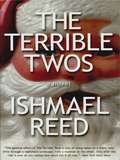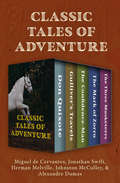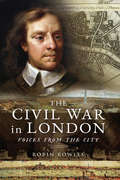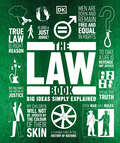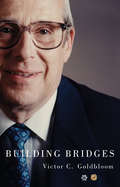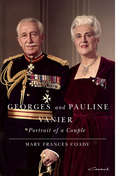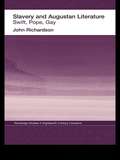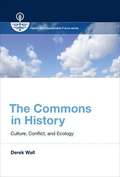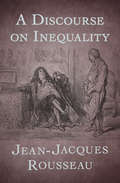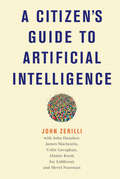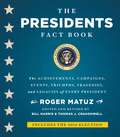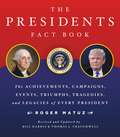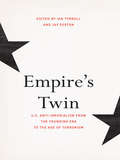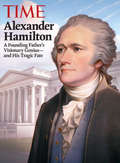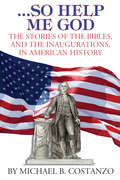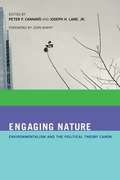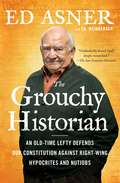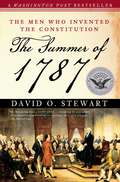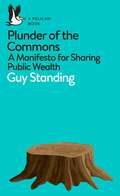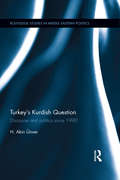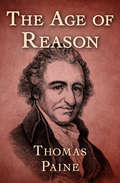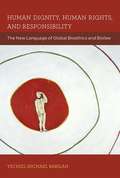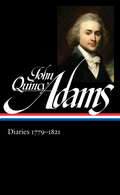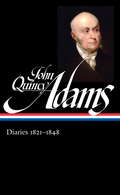- Table View
- List View
The Terrible Twos
by Ishmael ReedIshmael Reed's sixth novel depicts a zany, bizarre, and all-too-believable future where mankind's fate depends upon a jolly old gent named St. Nicholas and a Ristorasta dwarf named Black Peter, who together wreak mischievous havoc on Wall Street and in the Oval Office. This offbeat, on-target social critique makes marvelous fun of everything that is American, from commercialism to Congress, Santa Claus to religious cults.
Classic Tales of Adventure: Don Quixote, Gulliver's Travels, The Confidence-Man, The Mark of Zorro, and The Three Musketeers
by Miguel de Cervantes Jonathan Swift Herman Melville Johnston McCulley Alexandre DumasJourney to worlds both real and imagined with these timeless landmarks of literature.Don Quixoteby Miguel de Cervantes: Considered by many to be the first modern novel, this witty epic follows the famed nobleman from La Mancha on his quest to live up to the ideals of a chivalrous knight.Gulliver&’s Travelsby Jonathan Swift: The classic satire that takes Lemuel Gulliver to Lilliput, Brobdingnag, and other fantastical corners of the world.The Confidence-Manby Herman Melville: The intertwined tales of a group of passengers on a steamboat journey down the Mississippi River by the author of Moby Dick.The Mark of Zorroby Johnston McCulley: Originally published as The Curse of Capistrano, this is the book that introduced masked hero Diego Vega.The Three Musketeersby Alexandre Dumas: In seventeenth-century France, a daring young man defends the queen&’s honor and tests his skills against the best swordsmen of the day.
The Civil War in London: Voices from the City
by Robin RowlesThe Civil War years of the 1640s were amongst the most tumultuous in British history. The conflict between King Charles I and Parliament strained and split the social fabric of the British Isles. People of all classes who had previously coexisted peacefully found themselves opposing each other on political, religious, and economic grounds. Society was literally 'by the sword divided'.Much has been written on the subject to date. This book is different. London is its focus, with key players such as the Lord Mayor, the livery companies, the Church, and citizens, viewed through the city's lens and the streets around St Paul's and Cheapside. In looking at seemingly everyday events, unusual questions are raised: for example, where can you find a little known statue of Oliver Cromwell; what happened to the Cheapside Cross; who was Nemehiah Wallington and why was he important?The result of a London walk devised by the author, the books learned yet accessible approach will appeal to anyone interested in a new way of looking at a popular event in history. Bookended by the death of a Tudor queen and the beheading of a Stuart king, its chapters walk us through what happened in-between.
The Law Book (DK Big Ideas)
by DKLearn about the most important legal milestones in history in The Law Book.Part of the fascinating Big Ideas series, this book tackles tricky topics and themes in a simple and easy to follow format. Learn about Law in this overview guide to the subject, great for novices looking to find out more and experts wishing to refresh their knowledge alike! The Law Book brings a fresh and vibrant take on the topic through eye-catching graphics and diagrams to immerse yourself in. This captivating book will broaden your understanding of Law, with:- More than 90 ground-breaking legal milestones- Packed with facts, charts, timelines and graphs to help explain core concepts- A visual approach to big subjects with striking illustrations and graphics throughout- Easy to follow text makes topics accessible for people at any level of understandingThe Law Book is a captivating introduction to the legal precedents, and religious, political, and moral codes that have shaped the world we live in, aimed at adults with an interest in the subject and students wanting to gain more of an overview. Discover the most important milestones in legal history, from the Code of Hammurabi to groundbreaking legislation including Magna Carta and the Abolition of the Slave Trade Act, all through exciting text and bold graphics.Your Law Questions, Simply ExplainedThis engaging overview goes into legal history across the world, all the way into the 21st century, with copyright in the digital age, same-sex marriage, and the &“right to be forgotten&”. If you thought it was difficult to learn about legislations and legal history, The Law Book presents key information in an easy to follow layout. Learn about the most important breakthroughs, like the fight for universal suffrage and workers&’ rights, and the establishment of international legal bodies like INTERPOL and the European Court of Justice.The Big Ideas SeriesWith millions of copies sold worldwide, The Law Book is part of the award-winning Big Ideas series from DK. The series uses striking graphics along with engaging writing, making big topics easy to understand.
Building Bridges
by Victor C. GoldbloomA pediatrician, provincial politician, and pioneer of interfaith dialogue, Victor Goldbloom (b. 1923) has led a rich and varied life. Deeply committed to social issues, his dedication to reconciliating French and English, federalists and sovereignists, Christians and Jews, and his understanding of public health, the environment, and minority communities are unparalleled. Born in Montreal, Goldbloom received his medical degree from McGill University in 1945. A practising pediatrician for many years, he entered public life in 1962 as a governor of the College of Physicians and Surgeons of Quebec and in 1966 was elected to the Quebec Legislature. In 1970 he became the first member of Quebec's Jewish community to serve in the provincial cabinet, under Premier Robert Bourassa. A minister of the National Assembly until 1979, Goldbloom served as Quebec's first environment minster, and later as municipal affairs minister and minister responsible for the Olympics Installations Board. In the early 1990s he became Canada's Commissioner of Official Languages. In Building Bridges - a collection of personal anecdotes, media coverage of his impressive career, and transcriptions of two historic speeches - Goldbloom recounts the details of his remarkable life and lifelong commitment to Quebec and to Canada.
Georges and Pauline Vanier
by Mary Frances CoadyGeorges and Pauline Vanier follows their lives and travels across the world - from Canadian military life to the League of Nations, from the inner circles of British government to their harrowing escape from Nazi-occupied France - detailing their disappointments and triumphs during social and political turbulence. With insight and sympathy, Mary Frances Coady tells their dramatic personal story. Revealing their remarkably vibrant personalities, she details the couple's support of the French resistance as well as Georges Vanier's pleas for the Canadian government to accept refugees fleeing Hitler's horrors and his effort to broaden immigration policy. She also recounts the importance of their religious convictions, their controversial standing among Quebecers, and their early advocacy of official bilingualism. An invigorating and well-told tale of their lasting legacies, Georges and Pauline Vanier is the definitive account of the enduring contributions the Vaniers made to the world and to their country.
Slavery and Augustan Literature: Swift, Pope and Gay (Routledge Studies in Eighteenth-Century Literature)
by Dr J RichardsonSlavery and Augustan Literature investigates slavery in the work of Jonathan Swift, Alexander Pope and John Gay. These three writers were connected with a Tory ministry, which attempted to increase substantially the English share of the international slave trade. They all wrote in support of the treaty that was meant to effect that increase. The book begins with contemporary ideas about slavery, with the Tory ministry years and with texts written during those years. These texts tend to obscure the importance of the slave trade to Tory planning. In its second half, the book analyses the attitudes towards slavery in Pope's Horatian poems, An Essay on Man, Polly, A Modest Proposal and Gulliver's Travels. John Richardson shows how, despite differences, Swift, Pope and Gay adopt a mixed position of admiration for freedom alongside implicit support for slavery.
The Commons in History
by Derek WallAn argument that the commons is neither tragedy nor paradise but can be a way to understand environmental sustainability.
A Discourse on Inequality: A Discourse On The Origin Of Inequality, And A Discourse On Political Economy
by Jean-Jacques RousseauA fascinating examination of the relationship between civilization and inequality from one of history&’s greatest minds The first man to erect a fence around a piece of land and declare it his own founded civil society—and doomed mankind to millennia of war and famine. The dawn of modern civilization, argues Jean-Jacques Rousseau in this essential treatise on human nature, was also the beginning of inequality. One of the great thinkers of the Enlightenment, Rousseau based his work in compassion for his fellow man. The great crime of despotism, he believed, was the raising of the cruel above the weak. In this landmark text, he spells out the antidote for man&’s ills: a compassionate revolution to pull up the fences and restore the balance of mankind. This ebook has been professionally proofread to ensure accuracy and readability on all devices.
A Citizen's Guide to Artificial Intelligence
by John ZerilliA concise but informative overview of AI ethics and policy.Artificial intelligence, or AI for short, has generated a staggering amount of hype in the past several years. Is it the game-changer it's been cracked up to be? If so, how is it changing the game? How is it likely to affect us as customers, tenants, aspiring home-owners, students, educators, patients, clients, prison inmates, members of ethnic and sexual minorities, voters in liberal democracies? This book offers a concise overview of moral, political, legal and economic implications of AI. It covers the basics of AI's latest permutation, machine learning, and considers issues including transparency, bias, liability, privacy, and regulation.
Presidents Fact Book Revised and Updated!
by Bill Harris Roger Matuz Thomas J. CraughwellIn time for the 2015 presidential election cycle, this revised paperback edition is the most comprehensive, up-to-date guide on the presidents and includes the milestones of Barack Obama's first and second terms.The Presidents Fact Book is a complete compendium of all things presidential and a sweeping survey of American history through the biographical lens of every president from George Washington to Barack Obama. Organized chronologically by president, each entry covers the major accomplishments and events of the presidential term; cabinet members, election results, groundbreaking legislation, and Supreme Court appointments; personality and personal habits; career before the presidency; a behind-the-scenes look at the wives, families, friends, and foes; and much more, including hobbies, odd behaviors, and outlandish penchants. Major primary documents from each administration--from the Bill of Rights to Barack Obama's speech on race in America--provide a glimpse into the crucial moments of America's storied past in the words of those who were at the helm. Perfect for students, history buffs, and political junkies, The President's Fact Book is at once an expansive collage of our nation's 44 individual presidents and a comprehensive view of American history.
Presidents Fact Book Revised and Updated!: The Achievements, Campaigns, Events, Triumphs, and Legacies of Every President from George Washington to the Current One
by Bill Harris Thomas J. Craughwell Roger MatuzAn All-New Edition! The Presidents Fact Book is a complete compendium of all things presidential and a sweeping survey of American history through the biographical lens of every president from George Washington through Donald Trump. Organized chronologically by president, each entry covers the major accomplishments and events of the presidential term; cabinet members, election results, groundbreaking legislation, and Supreme Court appointments; personality and personal habits; career before the presidency; a behind-the-scenes look at the wives, families, friends, and foes; and much more, including hobbies, odd behaviors, and outlandish penchants. Major primary documents from each administration-from the Bill of Rights to Barack Obama's speech on race in America-provide a glimpse into the crucial moments of America's storied past in the words of those who led the nation. Perfect for students, history buffs, and political junkies, The President's Fact Book is at once an expansive collage of our nation's 45 individual presidents and a comprehensive view of American history.
Empire’s Twin: U.S. Anti-imperialism from the Founding Era to the Age of Terrorism
by Jay Sexton Ian TyrrellAcross the course of American history, imperialism and anti-imperialism have been awkwardly paired as influences on the politics, culture, and diplomacy of the United States. The Declaration of Independence, after all, is an anti-imperial document, cataloguing the sins of the metropolitan government against the colonies. With the Revolution, and again in 1812, the nation stood against the most powerful empire in the world and declared itself independent. As noted by Ian Tyrrell and Jay Sexton, however, American "anti-imperialism was clearly selective, geographically, racially, and constitutionally." Empire's Twin broadens our conception of anti-imperialist actors, ideas, and actions; it charts this story across the range of American history, from the Revolution to our own era; and it opens up the transnational and global dimensions of American anti-imperialism. By tracking the diverse manifestations of American anti-imperialism, this book highlights the different ways in which historians can approach it in their research and teaching. The contributors cover a wide range of subjects, including the discourse of anti-imperialism in the Early Republic and Civil War, anti-imperialist actions in the U.S. during the Mexican Revolution, the anti-imperial dimensions of early U.S. encounters in the Middle East, and the transnational nature of anti-imperialist public sentiment during the Cold War and beyond. Contributors: Laura Belmonte, Oklahoma State University; Robert Buzzanco, University of Houston; Julian Go, Boston University; Alan Knight, University of Oxford; Ussama Makdisi, Rice University; Erez Manela, Harvard University; Peter Onuf, Robert H. Smith International Center for Jefferson Studies, Monticello, and University of Virginia; Jeffrey Ostler, University of Oregon; Patricia Schechter, Portland State University; Jay Sexton, University of Oxford; Ian Tyrrell, University of New South Wales
TIME Alexander Hamilton: A Founding Father's Visionary Genius and His Tragic Fate
by Editors of TIMELong considered the forgotten founding father and primarily known for the duel with Aaron Burr that ended his life, Alexander Hamilton has recently achieved a new level of fame because of the hit Broadway musical Hamilton, inspired by the New York Times best-selling biography by acclaimed historian Ron Chernow.Now the editors of TIME present this special edition that celebrates Hamilton and his many accomplishments: as one of the primary architects of the Constitution, an aide and counsel to General George Washington, and the first secretary of the Treasury, as well as his intense, long-standing rivalry with Thomas Jefferson and how it affects our government to this day. Also included in this fully illustrated edition are "Six Things You Didn't Know About Alexander Hamilton," an interview with Chernow, the making of the Broadway musical, why Hamilton's days on the $10 bill are numbered, and much more.TIME brings keen insight to the improbable life of the illegitimate son of a Caribbean merchant who would go on to help shape our nation, lay the foundation for the modern economy, and become the inspiration for a musical that is inspiring Americans to interpret history in an entirely new way.
…So Help Me God: The Stories of the Bibles, and the Inaugurations, in American History
by Michael B. CostanzoThe author tells the ultimate story of the use of the Bible in the United States with a brief glance back to its first use by Charlemagne in 800 then quickly moves to the beginning of constitutional government in the United States. He tells of the inaugurations beginning with George Washington in New York in 1791 when he placed his hand on a Bible loaned by a nearby Masonic lodge. Following Washington's inauguration, the author tells the story of each Bible, where it came from, how it was secured and where it is now. The story of each inauguration is also told showing the remarkable trajectory of growth in presidential celebrations and the American culture. Presidential inaugurations in other governments, on what is now U.S. soil such as the Republic of Texas, the Confederate States of America and the Republic of Hawaii, are also told. As a prelude to the stories, the author brings into focus the various editions and printings of the Bible to meet the satisfactory demands of different perspectives. It is a complete look at the use of the Book in United States Officialdom. Since George Washington used one in his 1789 inauguration, the Bible has become an indelible part of almost every American presidential inauguration. This book is a history of known Bibles used in every American presidential inauguration. It covers the United States, as well as other governments which had one time or another occupied territories now part of the United States, such as the Confederate States of America, and the Republic of Texas.
Engaging Nature
by Peter F. Cannavò John Barry Joseph H. Lane Jr.Contemporary environmental political theory considers the implications of the environmental crisis for such political concepts as rights, citizenship, justice, democracy, the state, race, class, and gender. As the field has matured, scholars have begun to explore connections between Green Theory and such canonical political thinkers as Plato, Machiavelli, Locke, and Marx. The essays in this volume put important figures from the political theory canon in dialogue with current environmental political theory. It is the first comprehensive volume to bring the insights of Green Theory to bear in reinterpreting these canonical theorists.Individual essays cover such classical figures in Western thought as Aristotle, Hume, Rousseau, Mill, and Burke, but they also depart from the traditional canon to consider Mary Wollstonecraft, W. E. B. Du Bois, Hannah Arendt, and Confucius. Engaging and accessible, the essays also offer original and innovative interpretations that often challenge standard readings of these thinkers. In examining and explicating how these great thinkers of the past viewed the natural world and our relationship with nature, the essays also illuminate our current environmental predicament.Essays onPlato Aristotle Niccolò Machiavelli Thomas Hobbes John Locke David Hume Jean-Jacques Rousseau Edmund Burke Mary Wollstonecraft John Stuart Mill Karl Marx W. E. B. Du Bois Martin Heidegger Hannah Arendt Confucius ContributorsSheryl D. Breen, W. Scott Cameron, Peter F. Cannavò, Joel Jay Kassiola, Joseph H. Lane Jr. Timothy W. Luke, John M. Meyer, Özgüç Orhan, Barbara K. Seeber, Francisco Seijo, Kimberly K. Smith, Piers H. G. Stephens, Zev Trachtenberg, Andrew Valls, Harlan Wilson
The Grouchy Historian: An Old-Time Lefty Defends Our Constitution Against Right-Wing Hypocrites and Nutjobs
by Ed Asner Ed. WeinbergerIn the tradition of Al Franken and Michael Moore, Ed Asner—a.k.a. Lou Grant from The Mary Tyler Moore Show—reclaims the Constitution from the right-wingers who think that they and only they know how to interpret it.Ed Asner, a self-proclaimed dauntless Democrat from the old days, figured that if the right-wing wackos are wrong about voter fraud, Obama’s death panels, and climate change, they are probably just as wrong about what the Constitution says. There’s no way that two hundred-plus years later, the right-wing ideologues know how to interpret the Constitution. On their way home from Philadelphia the people who wrote it couldn’t agree on what it meant. What was the president’s job? Who knew? All they knew was that the president was going to be George Washington and as long as he was in charge, that was good enough. When Hamilton wanted to start a national bank, Madison told him that it was unconstitutional. Both men had been in the room when the Constitution was written. And now today there are politicians and judges who claim that they know the original meaning of the Constitution. Are you kidding? In The Grouchy Historian, Ed Asner leads the charge for liberals to reclaim the Constitution from the right-wingers who use it as their justification for doing whatever terrible thing they want to do, which is usually to comfort the comfortable and afflict the afflicted. It’s about time someone gave them hell and explained that progressives can read, too.
The Summer of 1787
by David O. StewartThe Summer of 1787 takes us into the sweltering room in which the founding fathers struggled for four months to produce the Constitution: the flawed but enduring document that would define the nation--then and now.George Washington presided, James Madison kept the notes, Benjamin Franklin offered wisdom and humor at crucial times. The Summer of 1787 traces the struggles within the Philadelphia Convention as the delegates hammered out the charter for the world's first constitutional democracy. Relying on the words of the delegates themselves to explore the Convention's sharp conflicts and hard bargaining, David O. Stewart lays out the passions and contradictions of the, often, painful process of writing the Constitution. It was a desperate balancing act. Revolutionary principles required that the people have power, but could the people be trusted? Would a stronger central government leave room for the states? Would the small states accept a Congress in which seats were allotted according to population rather than to each sovereign state? And what of slavery? The supercharged debates over America's original sin led to the most creative and most disappointing political deals of the Convention. The room was crowded with colorful and passionate characters, some known--Alexander Hamilton, Gouverneur Morris, Edmund Randolph--and others largely forgotten. At different points during that sultry summer, more than half of the delegates threatened to walk out, and some actually did, but Washington's quiet leadership and the delegates' inspired compromises held the Convention together. In a country continually arguing over the document's original intent, it is fascinating to watch these powerful characters struggle toward consensus--often reluctantly--to write a flawed but living and breathing document that could evolve with the nation.
The Summer of 1787
by David O. StewartThe successful creation of the Constitution is a suspense story. The Summer of 1787 takes us into the sweltering room in which delegates struggled for four months to produce the flawed but enduring document that would define the nation -- then and now. George Washington presided, James Madison kept the notes, Benjamin Franklin offered wisdom and humor at crucial times. The Summer of 1787 traces the struggles within the Philadelphia Convention as the delegates hammered out the charter for the world's first constitutional democracy. Relying on the words of the delegates themselves to explore the Convention's sharp conflicts and hard bargaining, David O. Stewart lays out the passions and contradictions of the often painful process of writing the Constitution. It was a desperate balancing act. Revolutionary principles required that the people have power, but could the people be trusted? Would a stronger central government leave room for the states? Would the small states accept a Congress in which seats were alloted according to population rather than to each sovereign state? And what of slavery? The supercharged debates over America's original sin led to the most creative and most disappointing political deals of the Convention. The room was crowded with colorful and passionate characters, some known -- Alexander Hamilton, Gouverneur Morris, Edmund Randolph -- and others largely forgotten. At different points during that sultry summer, more than half of the delegates threatened to walk out, and some actually did, but Washington's quiet leadership and the delegates' inspired compromises held the Convention together. In a country continually arguing over the document's original intent, it is fascinating to watch these powerful characters struggle toward consensus -- often reluctantly -- to write a flawed but living and breathing document that could evolve with the nation.
Plunder of the Commons: A Manifesto for Sharing Public Wealth (Pelican Books)
by Guy Standing'One of the most important books I've read in years' Brian EnoWe are losing the commons. Austerity and neoliberal policies have depleted our shared wealth; our national utilities have been sold off to foreign conglomerates, social housing is almost non-existent, our parks are cordoned off for private events and our national art galleries are sponsored by banks and oil companies. This plunder deprives us all of our common rights, recognized as far back as the Magna Carta and the Charter of the Forest of 1217, to share fairly and equitably in our public wealth.Guy Standing leads us through a new appraisal of the commons, stemming from the medieval concept of common land reserved in ancient law from marauding barons, to his modern reappraisal of the resources we all hold in common - a brilliant new synthesis that crystallises quite how much public wealth has been redirected to the 1% in recent decades through the state-approved exploitation of everything from our land to our state housing, health and benefit systems, to our justice system, schools, newspapers and even the air we breathe. Plunder of the Commons proposes a charter for a new form of commoning, of remembering, guarding and sharing that which belongs to us all, to slash inequality and soothe our current political instability.
Turkey's Kurdish Question: Discourse & Politics Since 1990 (Routledge Studies in Middle Eastern Politics)
by Hamid Akin UnverThe Kurdish question is one of the most complicated and protracted conflicts of the Middle East and will never be resolved unless it is finally defined. The majority of the Kurdish people live in Turkey, which gives the country a unique position in the larger Kurdish conundrum. Society in Turkey is deeply divided over the definition and even existence of the Kurdish question, and this uncertainty has long manifested itself in its complete denial, or in accusations of political rivals of ‘separatism’ and even ‘treason’. Turkey’s Kurdish Question explores how these denial and acknowledgement dynamics often reveal pre-existing political ideology and agenda priorities, themselves becoming political actions. While the very term "Kurdish question" is discussed in the academic literature as a given, a new and systemic study is required to deconstruct and analyze the constitutive parts of this discursive construct. This book provides the first comprehensive study and analysis of the discursive constructions and perceptions of what is broadly defined as the "Kurdish question" in Turkish, European and American political cultures. Furthermore, its new methodological approach to the study of discourse and politics of secessionist conflicts can be applied to many similar intra-state conflict cases. Turkey’s Kurdish Question would suit students and scholars of Middle East studies, Conflict studies and Comparative Politics, as well as Turkish or Kurdish studies. H. Akın Ünver is an assistant professor of international relations at Kadir Has University. This book is based on his dissertation ‘Defining Turkey’s Kurdish Question‘, which has won the Middle East Studies Association (MESA) 2010 Malcolm H. Kerr award for the best dissertation in the field of social sciences.
The Age of Reason: Being An Investigation Of True And Fabulous Theology - Primary Source Edition
by Thomas PaineThe author of Rights of Man and Common Sense argues for belief in God without religion.My own mind is my own church. In The Age of Reason, political activist and Founding Father Thomas Paine makes a powerful case for a rational approach to theology. In keeping with the intellectual tradition of British Deism, Paine rejects the notion of divine revelation, saying “it is revelation to the first person only, and hearsay to every other.” He proceeds with a detailed analysis of the Bible’s inconsistencies and historical inaccuracies to conclude that it cannot be a divinely inspired text. Arguing against all forms of organized religion, he declares nature itself to be the only true testament to the existence of a divine creator. Originally published in three parts, in 1794, 1795, and 1807, The Age of Reason was a major influence on the freethinker movement in the United States. In Britain, however, it was declared seditious and led to the arrest of those who dared to print and distribute it. This ebook has been professionally proofread to ensure accuracy and readability on all devices.
Human Dignity, Human Rights, and Responsibility
by Yechiel Michael Barilan"Human dignity" has been enshrined in international agreements and national constitutions as a fundamental human right. The World Medical Association calls on physicians to respect human dignity and to discharge their duties with dignity. And yet human dignity is a term--like love, hope, and justice--that is intuitively grasped but never clearly defined. Some ethicists and bioethicists dismiss it; other thinkers point to its use in the service of particular ideologies. In this book, Michael Barilan offers an urgently needed, nonideological, and thorough conceptual clarification of human dignity and human rights, relating these ideas to current issues in ethics, law, and bioethics. Combining social history, history of ideas, moral theology, applied ethics, and political theory, Barilan tells the story of human dignity as a background moral ethos to human rights. After setting the problem in its scholarly context, he offers a hermeneutics of the formative texts on Imago Dei; provides a philosophical explication of the value of human dignity and of vulnerability; presents a comprehensive theory of human rights from a natural, humanist perspective; explores issues of moral status; and examines the value of responsibility as a link between virtue ethics and human dignity and rights. Barilan accompanies his theoretical claim with numerous practical illustrations, linking his theory to such issues in bioethics as end-of-life care, cloning, abortion, torture, treatment of the mentally incapacitated, the right to health care, the human organ market, disability and notions of difference, and privacy, highlighting many relevant legal aspects in constitutional and humanitarian law.
John Quincy Adams: Diaries 1779-1821
by David Waldstreicher John Quincy AdamsFor the 250th anniversary of John Quincy Adams's birth, a landmark new edition of an American masterpiece: the incomparable self-portrait of a man and his times from the Revolution to the coming of the Civil War.The diary of John Quincy Adams is one of the most extraordinary works in American literature. Begun in 1779 at the age of twelve and kept more or less faithfully until his death almost 70 years later, it is both an unrivaled record of historical events and personalities from the nation's founding to the antebellum era and a masterpiece of American self-portraiture, tracing the spiritual, literary,and scientific interests of an exceptionally lively mind. Now, for the 250th anniversary of Adams's birth, Library of America and historian David Waldstreicher present a two-volume reader's edition based for the first time on the original manuscript diaries, restoring personal and revealing passages suppressed in earlier editions.Volume I begins during the American Revolution, with Adams's first entry, as he prepares to embark on a perilous wartime voyage to Europe with his father, diplomat John Adams, and records his early impressions of Franklin and Jefferson and of Paris on the eve of revolution; it details his abbreviated but eventful years of study at Harvard and his emergence into the world of politics in his own right, as American minister to the Netherlands and to Prussia, and then as a U. S. senator from Massachusetts; and it reveals a young man at war with his passions, before finding love with the remarkable Louisa Catherine Johnson. In passages that form a kind of real-world War and Peace, the diary follows the young married couple to St. Petersburg, where as U.S. minister Adams is a witness to Napoleon's invasion of Russia. Its account of the negotiations at Ghent to end the War of 1812, where Adams leads the American delegation, is the perhaps the most detailed and dramatic picture of a diplomatic confrontation ever recorded. Volume 1 concludes with his elevation as Secretary of State under James Monroe, as he takes the fore in a fractious cabinet and emerges as the principal architect of what will become known as the Monroe Doctrine.
John Quincy Adams: Diaries 1821-1848
by David Waldstreicher John Quincy AdamsFor the 250th anniversary of John Quincy Adams's birth, a landmark new edition of an American masterpiece: the incomparable self-portrait of a man and his times from the Revolution to the coming of the Civil War.The diary of John Quincy Adams is one of the most extraordinary works in American literature. Begun in 1779 at the age of twelve and kept more or less faithfully until his death almost 70 years later, it is both an unrivaled record of historical events and personalities from the nation's founding to the antebellum era and a masterpiece of American self-portraiture, tracing the spiritual, literary,and scientific interests of an exceptionally lively mind. Now, for the 250th anniversary of Adams's birth, Library of America and historian David Waldstreicher present a two-volume reader's edition based for the first time on the original manuscript diaries, restoring personal and revealing passages suppressed in earlier editions.Volume 2 opens with Adams serving as Secretary of State, amid political maneuverings within and outside James Monroe's cabinet to become his successor, a process that culminates in Adams's election to the presidency by the House of Representatives after the deadlocked four-way contest of 1824. Even as Adams takes the oath of office, rivals Henry Clay, his Secretary of State, John C. Calhoun, his vice president, and an embittered Andrew Jackson, eye the election of 1828. The diary records in candid detail his frustration as his far-sighted agenda for national improvement founders on the rocks of internecine political factionalism, conflict that results in his becoming only the second president, with his father, to fail to secure reelection. After a short-lived retirement, Adams returns to public service as a Congressman from Massachusetts, and for the last seventeen years of his life he leads efforts to resist the extension of slavery and to end the notorious "gag rule" that stifles debate on the issue in Congress. In 1841 he further burnishes his reputation as a scourge of the Slave Power by successfully defending African mutineers of the slave ship Amistad before the Supreme Court. The diary achieves perhaps its greatest force in its prescient anticipation of the Civil War and Emancipation, an "object," as Adams described it during the Missouri Crisis, "vast in its compass, awful in its prospects, sublime and beautiful in its issue."
